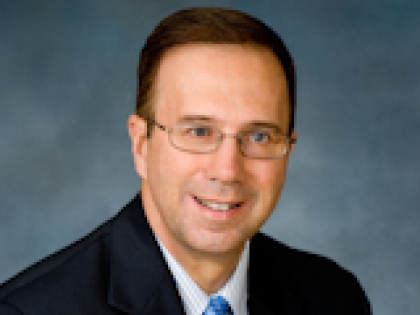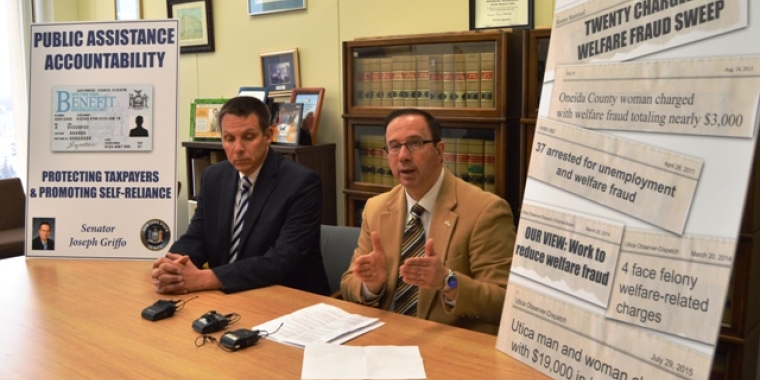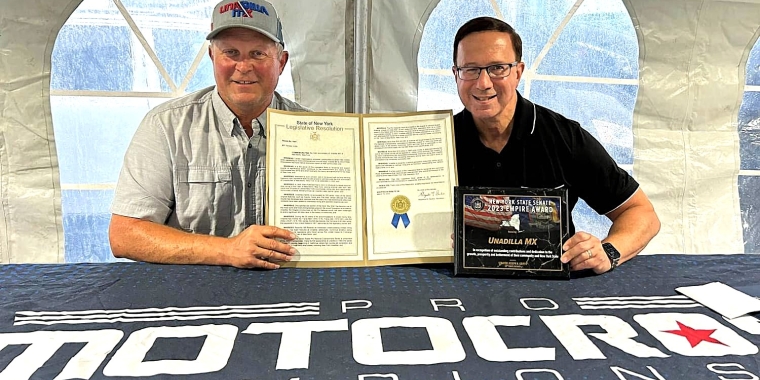
Griffo bill proposes stricter guidelines for public assistance accountability
February 16, 2016
-
ISSUE:
- Public Assistance

UTICA – State Senator Joseph Griffo on Tuesday proposed a set of new statewide rules that would require recipients of certain public assistance benefits to apply for work, as well as strictly limit what those benefits can be spent on.
This proposed legislation for public assistance accountability (S6071) would also establish a series of escalating penalties for each failure to comply with the laws and rules that govern the state’s Supplemental Nutrition Assistance Program, or SNAP. Currently, only the business is penalized if someone misuses their SNAP benefits at an establishment – this bill would now also hold SNAP recipients accountable for any misuse, with the goal of discouraging any further abuse of the system.
Alongside Oneida County District Attorney Scott McNamara, Senator Griffo explained that these proposals are not meant to increase the challenges for those individuals who rely on public assistance. Instead, Senator Griffo’s intent is to encourage these recipients to wisely spend their benefits in ways that support them and their families, while also keeping them focused on the goal of finding employment that will allow them to once again become self-reliant.
Since Governor Andrew Cuomo is now seeking to increase the income eligibility threshold so more families can qualify for SNAP benefits, Senator Griffo believes now is also the right time to support his legislation calling for a stricter set of guidelines.
Senator Joseph Griffo, R-Rome, said: “Many people in our community need public assistance benefits to help support themselves and their families, and in the Senate I have always supported helping those in need through funding opportunities in the budget. But these funds are most effective only when they are spent with good intentions, and all across the state we see daily examples of waste, fraud and abuse of the system. Spending SNAP benefits on cigarettes and alcohol, or gambling and strip clubs, serves no purpose to help ease a family’s hardship, nor is it the best use of our limited taxpayer dollars. By also requiring these recipients to apply for employment, I believe this proposed legislation will help create the best opportunity for them to return to work and lift themselves and their families out of hard times.”
New York State does not currently have a uniform set of work requirements for SNAP recipients, nor does it impost strict limitations on what can be purchased with these funds. The following provisions of Senator Griffo’s legislation would help address these shortcomings:
- WORK REQUIREMENT: All applicants for public assistance must apply in writing for three separate advertised job and provide the Department of Social Services with verifiable documentation of the applications. Documentation can be submitted either within one week before the application of benefits, or up to two weeks after.
- PENALTIES FOR NON-COMPLIANCE: By failing to comply with these work requirements, SNAP benefits must be terminated according to the following scale of penalties:
(1) First violation: Benefits terminated for the adult recipient
(2) Second violation: Benefits terminated for the adult recipient and their full family unit.
(3) Third and subsequent violations: Benefits terminated for the adult recipient and their full family unit for six consecutive months.
An adult recipient of SNAP benefits has the ability to appeal a sanction that would impact the full family unit by demonstrating through good cause why those benefits should not be terminated. Once a recipient complies with all rules and regulations, their benefits must be restored.
- UNAUTHORIZED SPENDING: A recipient may not spend SNAP benefits available through an Electronic Benefits Transfer system – or EBT card – on tobacco products, alcoholic beverages, gambling or gaming activity, lotteries conducted by the state, bail or tattoos.
A SNAP recipient’s EBT card also may not be used for transactions at the following: (1) a liquor store, or any other store where 50 percent or more of its business comes from the sale of alcoholic beverages; (2) a gambling or gaming facility; (3) a strip club; and (4) a tobacco specialty store.
Furthermore, a SNAP recipient may not use their benefits outside New York State, and no more than 15 percent of a recipient’s monthly SNAP benefit may be withdrawn in cash.
Most of the people who receive public assistance honestly follow the rules for receiving these benefits, and they truly use the funds in the best interest of their families, Senator Griffo said. But news headlines across the Mohawk Valley and the state, year after year, clearly show that some recipients do take advantage of the public assistance system – either through misuse or criminal fraud – which wastes millions of taxpayer dollars and prevents more of these funds from being available for those who truly do need the help.
By establishing a more stringent set of statewide rules concerning how SNAP benefits are used, Senator Griffo’s proposed legislation would create another level of accountability to help prevent welfare fraud and ensure that public assistance helps the people who need it most.
Oneida County District Attorney Scott McNamara said: “There is no doubt that many families in our community are in desperate need of the help that public assistance benefits can provide, but yet I am disturbed by the abuse and fraud that occur within this system. Hardworking taxpayers are frustrated that while they struggle everyday to make ends meet, they are sometimes forced to live less comfortably than those individuals who repeatedly get away with abusing a public assistance system that is not properly monitored. I fully support providing benefits to the poor, but the taxpayers of New York deserve and demand a system that helps those truly in need while holding accountable those who choose to exploit it.”
###
related legislation
Share this Article or Press Release
Newsroom
Go to NewsroomGriffo and Hunter bill signed into law by governor
September 5, 2024
Griffo and Miller legislation signed into law
August 29, 2024
